Key takeaways:
- Sustainable gardening enhances biodiversity, reduces maintenance, and improves personal well-being through engaging with nature.
- Key techniques include utilizing mulch, practicing crop rotation, and establishing a closed-loop system with composting to enrich the garden.
- Challenges like weather unpredictability and pest management require patience and creativity to maintain sustainable practices effectively.
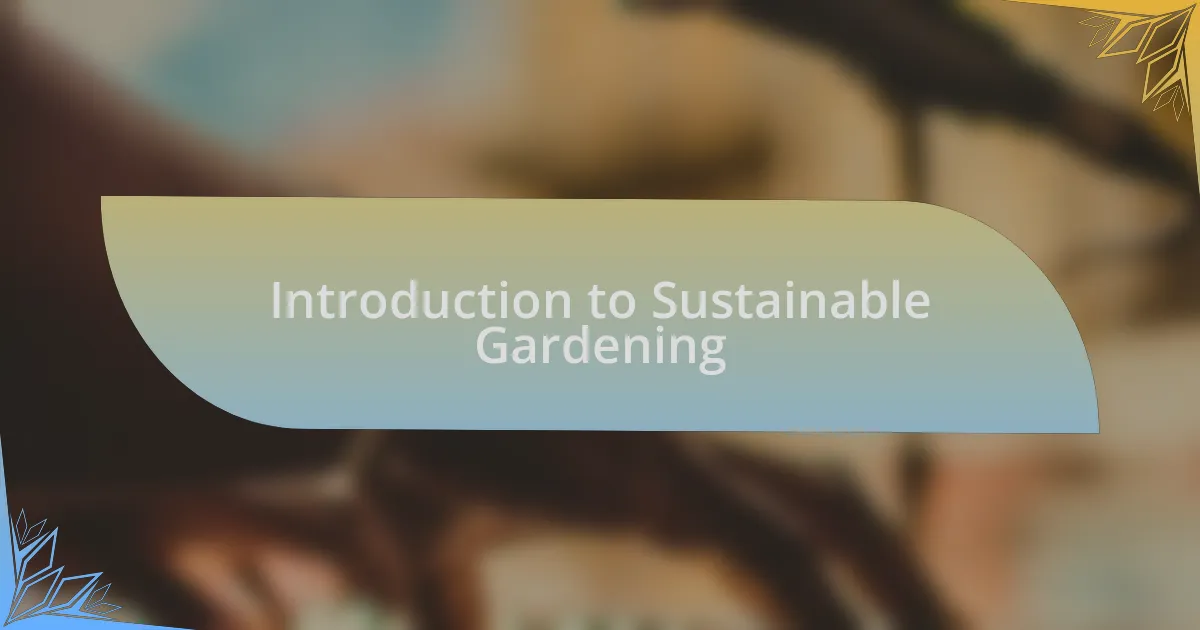
Introduction to Sustainable Gardening
Sustainable gardening is more than just a trend; it’s a commitment to nurturing our environment while producing beautiful and nourishing plants. I remember the first time I realized that my gardening efforts could positively impact the planet. Standing in my garden, surrounded by vibrant colors and buzzing insects, I felt a sense of responsibility and joy knowing that my choices mattered.
Have you ever thought about how your gardening practices affect the ecosystem? When I began integrating composting and companion planting, I noticed not only healthier plants but also a deeper connection to the earth—a relationship that goes beyond just growing food. The small act of enriching the soil with organic matter made my garden thrive, and it sparked a profound appreciation for nature’s interconnectedness.
At its core, sustainable gardening is about embracing practices that protect our air, water, and soil, while also fostering biodiversity. Each time I choose native plants or refrain from using harmful pesticides, I feel empowered. It’s like crafting a miniature world where I can balance productivity with environmental stewardship, paving the way for a more resilient habitat for all living creatures.
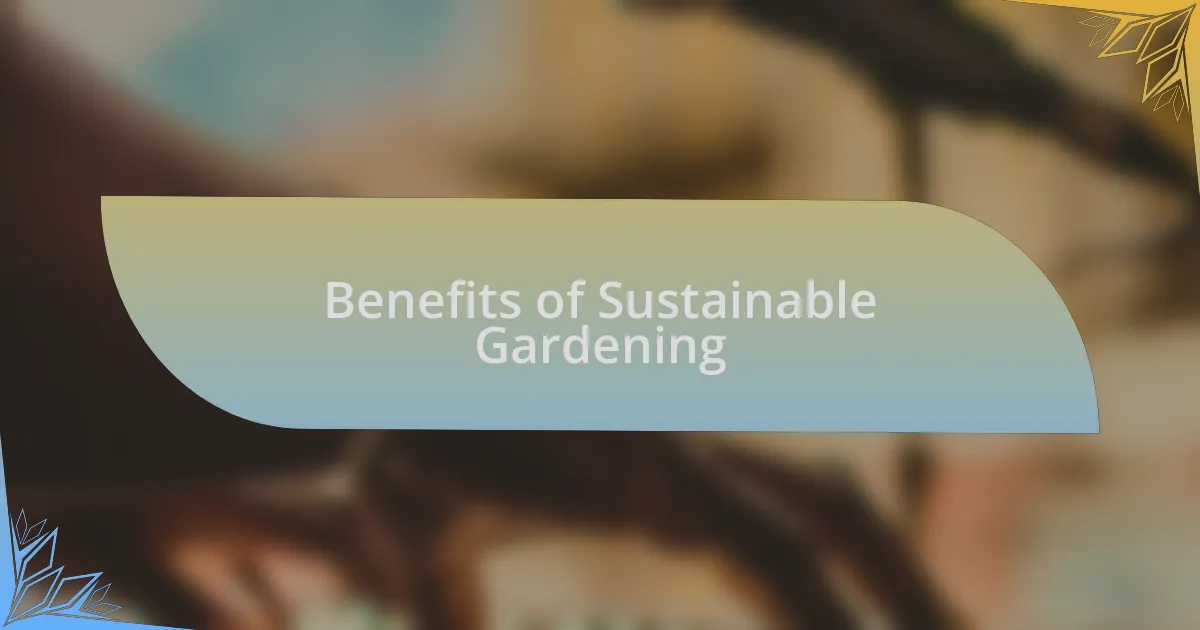
Benefits of Sustainable Gardening
Sustainable gardening offers a wealth of benefits that extend beyond just growing plants. For instance, when I made the switch to organic methods, I found that my garden not only flourished but also attracted a diverse array of wildlife. I remember the excitement of seeing butterflies and bees buzzing around, reinforcing the idea that my choices were nurturing an entire ecosystem. Don’t you think it’s incredible how small changes in our gardening habits can lead to such thriving biodiversity?
Another advantage I’ve experienced is the significant reduction in maintenance time. Initially, I was overwhelmed with weeding and watering, but implementing strategies like mulching and planting drought-resistant species transformed my gardening experience. As my workload lightened, I found more time to enjoy the peace my garden provided, making it a true sanctuary. Can you imagine stepping into your backyard and feeling a wave of tranquility wash over you, simply because your garden is thriving effortlessly?
Lastly, sustainable gardening has a profound impact on personal well-being. I often reflect on my mental state while tending to my plants—the act of gardening is not just physical; it’s therapeutic. I’ve discovered that nurturing a garden can reduce stress and enhance mood, creating an oasis that improves my overall quality of life. Have you ever noticed how being surrounded by greenery can uplift your spirit? I know I have, and it reinforces my commitment to gardening sustainably.
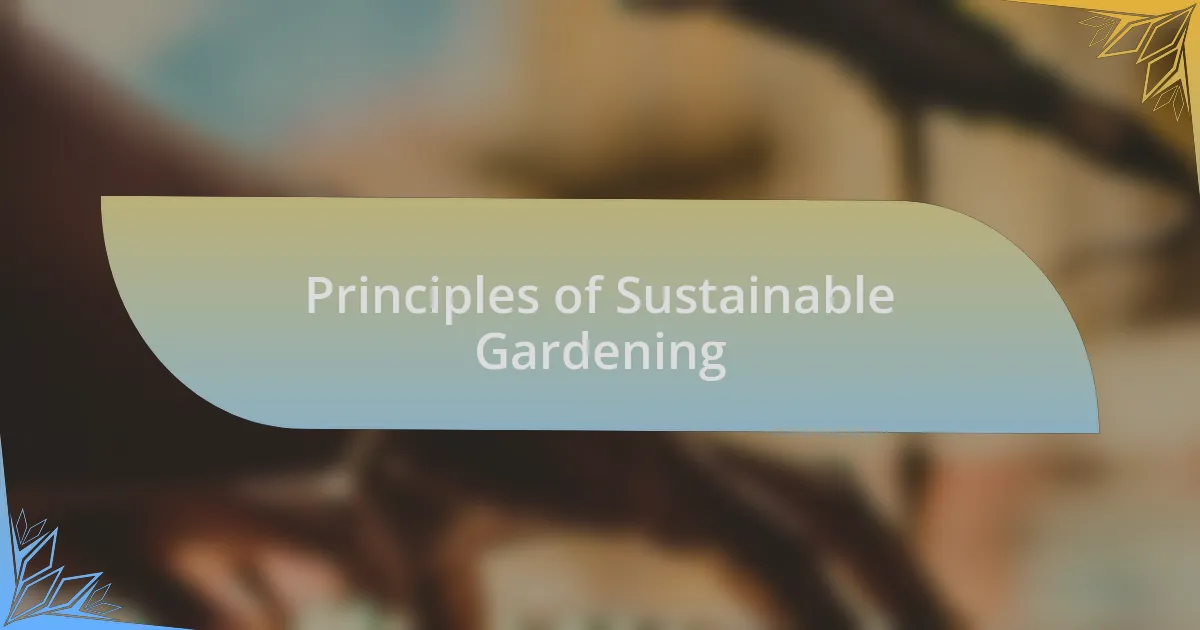
Principles of Sustainable Gardening
Sustainable gardening revolves around the principle of working with nature rather than against it. I remember my first attempt at companion planting, when I paired tomatoes with basil. Not only did the plants thrive, but I could practically taste the difference in flavor during harvest time. Doesn’t it feel rewarding to see how plants can support each other rather than merely coexisting?
Another foundational principle is utilizing native plants, which I increasingly incorporate into my garden. After experiencing the vibrant blooms of native wildflowers, I realized they require less water and are more resilient to local pests. It’s almost magical to witness how they attract local pollinators, as if nature appreciates my efforts to maintain its balance. Have you ever felt a sense of connection to your local environment through your gardening choices?
Lastly, I strive for a closed-loop system, recycling organic waste to enrich my soil. Turning kitchen scraps into compost transformed my approach to waste, and seeing the rich, dark soil emerge from what would have been discarded feels like a small victory. The more I compost, the more I appreciate the cycle of life in my garden. Have you tried composting in your own yard? It’s a simple yet impactful way to contribute to a sustainable ecosystem and cultivate healthier plants.
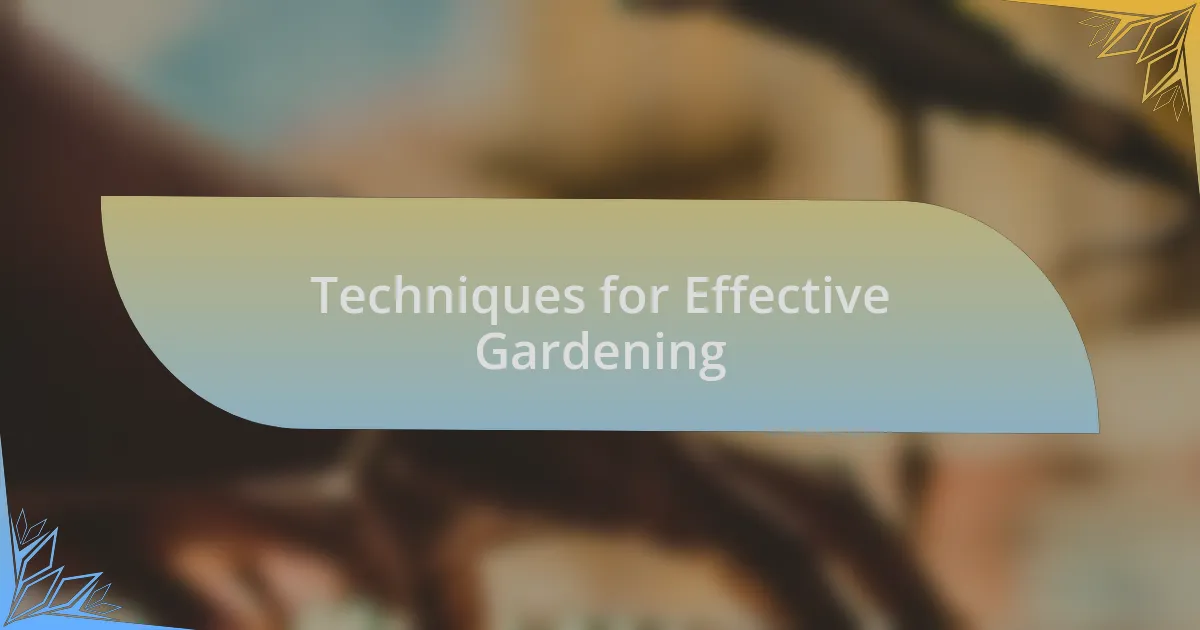
Techniques for Effective Gardening
When it comes to effective gardening, I’ve found that using mulch is a game changer. The first time I spread a thick layer of straw around my plants, I noticed a significant reduction in weeds, and the soil retained moisture much better during hot days. Have you ever watched a garden thrive simply because you provided it with proper protection?
Another technique I swear by is crop rotation. I recall the year I experimented with moving my bean plants to a different bed each season. Not only did it break the cycle of pests and diseases, but it also kept my soil nutrient-rich and diverse. Isn’t it fascinating how just changing the location of your plants can invigorate your garden’s health?
Lastly, I make it a habit to observe my garden regularly. By spending just a few minutes each day, I’ve learned to spot changes and address issues before they escalate. It’s incredible how attentive observation can reveal the subtle signs of plant distress—or surprise blooms! Have you taken the time to really connect with your garden on a daily basis? The insights you gain are invaluable.
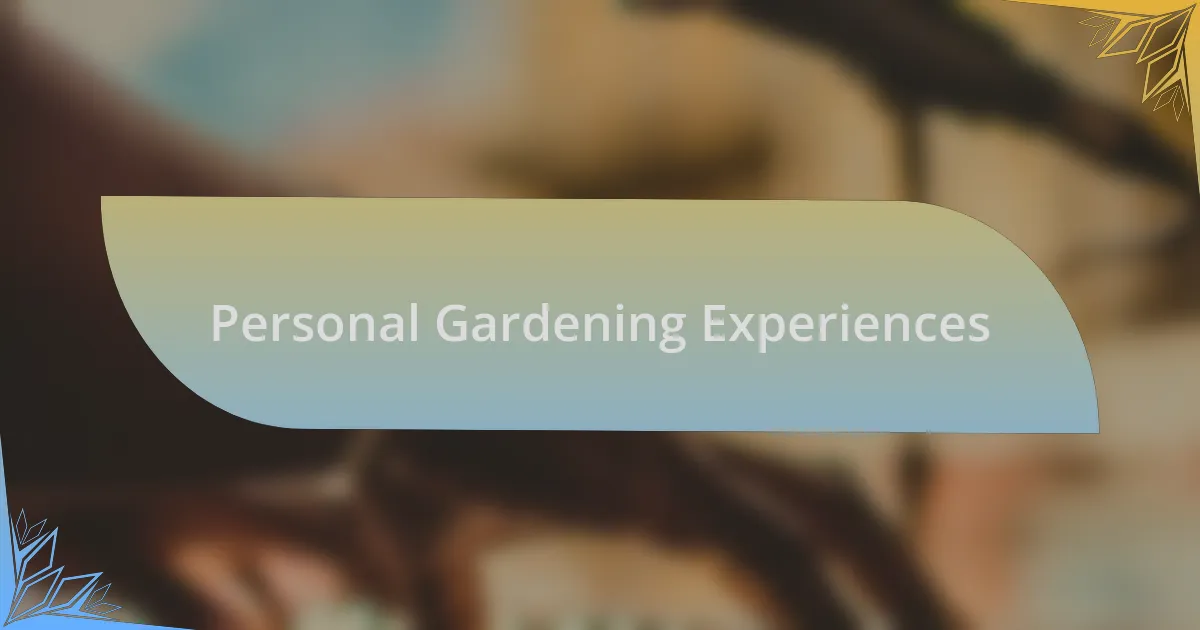
Personal Gardening Experiences
I vividly remember the first time I planted heirloom tomatoes. I was surprised by how much care they needed compared to regular varieties. It felt like nurturing a small child; I found myself talking to them while watering, hoping my warmth would encourage their growth. Have you ever bonded with a plant in such a way?
Another memorable experience was when I decided to try companion planting. I mixed marigolds with my vegetables, and the results were astonishing. Not only did the marigolds deter pests, but they also brightened my garden. I can’t help but smile whenever I see their vibrant orange and yellow petals dancing in the wind—don’t you think aesthetics in gardening matter just as much as function?
One particularly rainy summer, my garden transformed into a wild jungle. While I initially felt overwhelmed, I learned to embrace nature’s chaos. I discovered hidden gems—unexpected flowers blooming in the most unusual spots. Has your garden ever surprised you in ways you didn’t anticipate? Those moments of serendipity remind me why I cherish my gardening journey.
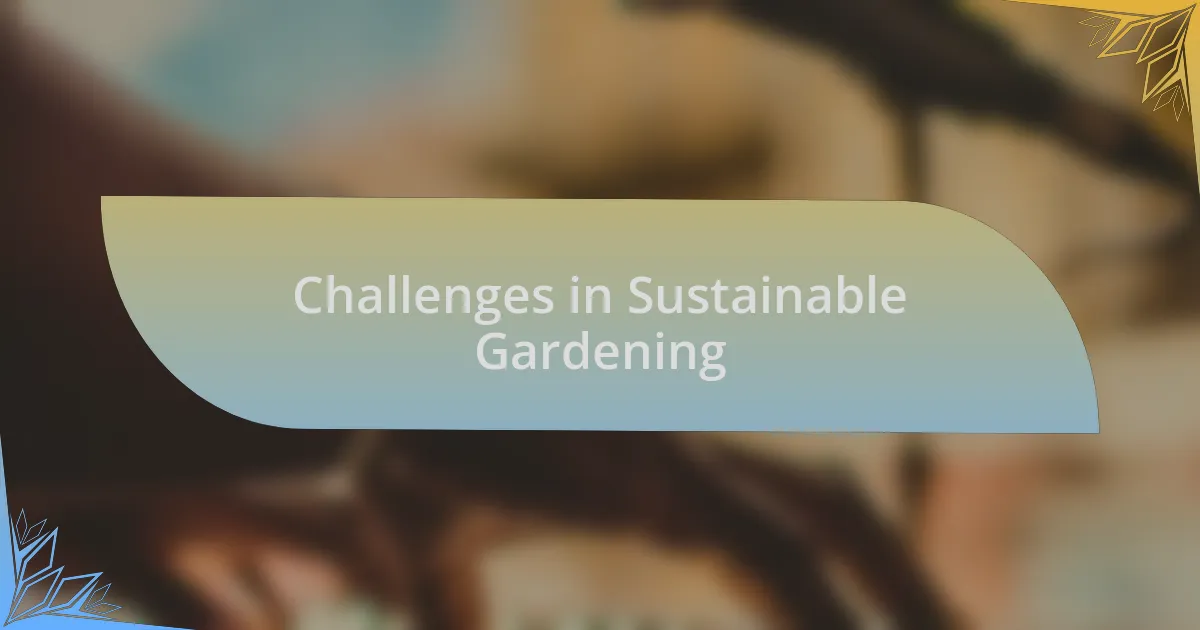
Challenges in Sustainable Gardening
Sustainable gardening often presents a unique set of challenges, mainly due to the climate’s unpredictability. For instance, I once faced a drought that left my plants struggling. Watching my seedlings wilt in the sun was disheartening; it forced me to rethink my watering strategies. Have you encountered a period where weather dramatically affected your garden? It’s both frustrating and illuminating, reflecting just how much nature influences our efforts.
Another challenge I’ve run into is pest management without the use of chemicals. One summer, my vegetable patch fell victim to aphids. I resorted to making a homemade insecticidal soap using natural ingredients. While it was effective, the process tested my patience and took way longer than simply grabbing a bottle from the store. Have you ever had to put in extra effort to stay true to sustainable practices? It’s a reminder that gardening often requires balancing ethics with practicality.
Nutrient-rich soil is essential for flourishing plants, but achieving that through sustainable methods can be tricky. When I started composting, I faced hurdles like unpleasant odors and pests. At times, it felt like I was running a miniature science experiment in my backyard instead of nurturing a garden. Have you experienced the complexities of composting? Still, overcoming these obstacles deepened my appreciation for the ecosystem I was nurturing, turning my initial frustrations into valuable learning experiences.
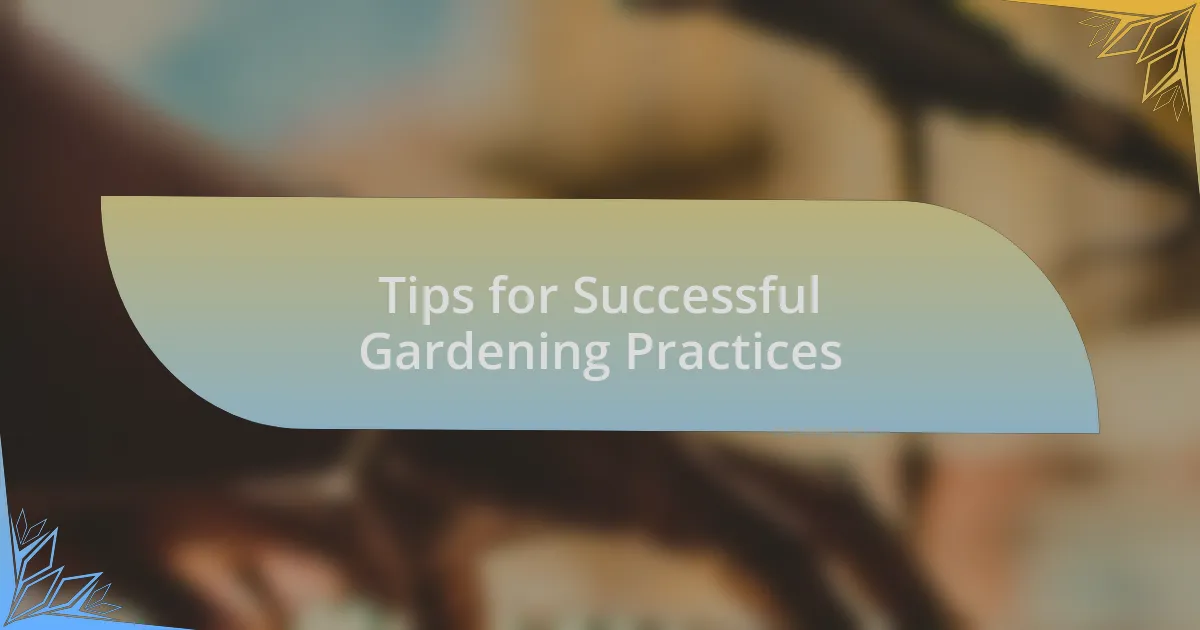
Tips for Successful Gardening Practices
Successful gardening practices hinge on meticulous planning and patience. I remember a season when I decided to experiment with crop rotation. It felt like a complex dance, but the results were incredible! Changing the location of my vegetables helped reduce disease and boosted soil fertility. Have you tried altering your planting strategies? The exploration keeps the gardening process exciting and rewarding.
I’ve also found that timing can make or break your gardening efforts. One spring, I was so eager to plant my seeds that I didn’t pay attention to the last frost date. The chilly nights caught me off guard, and I lost many delicate seedlings. It was a tough lesson learned. Have you ever jumped the gun with planting? Waiting for the right conditions ensures that your plants can thrive and flourish.
Moreover, I’ve learned the importance of companion planting. This practice encourages beneficial relationships among plants. I once paired marigolds with my tomatoes, and it was as if they formed a protective alliance against pests. It was thrilling to watch my garden thrive through these partnerships. Have you experienced the magic of companion planting? The synergy between plants can create a vibrant ecosystem right in your backyard.